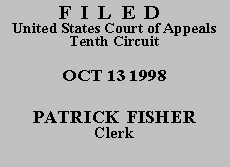

| In re:
CRIMINAL SUBPOENA DUCES TECUM SERVED ON FBI SA ED GRAY.
STATE OF OKLAHOMA, Plaintiff-Appellee, v. DEWAYNE E. HOPKINS, Defendant-Appellant, UNITED STATES OF AMERICA, Defendant-Appellee. |
|
In an Oklahoma state court criminal proceeding in which he was named as a defendant, appellant Dewayne E. Hopkins served a subpoena on Federal Bureau of Investigations Special Agent Ed Gray, directing him to appear and produce official documents at a state court preliminary hearing. Agent Gray declined to appear upon the direction of the Department of Justice. The state court entered an order to enforce the subpoena. Thereafter, the United States removed the subpoena issue to federal district court, pursuant to 28 U.S.C. § 1442(a), where the court quashed the state court subpoena. Appellant now appeals from that order. We affirm.
The Department of Justice invoked 28 C.F.R. §§ 16.21 through 16.29 as grounds for refusal to comply with the subpoena, offering only part of the materials in the possession of the FBI. Appellant maintains he is entitled to all of the materials to permit him to defend against the state criminal charges. He claims that 5 U.S.C. § 301, under which the regulations were promulgated, does not permit the government to withhold information and the regulations must yield to his constitutional rights to due process, to confront his accusers and to compulsory process.
The parties agree on the underlying facts. The issues presented on appeal are questions of law which we review de novo. See Manning v. United States, 146 F.3d 808, 813 (10th Cir. 1998).
It is undisputed that Agent Gray is a federal employee, not a department official authorized to release information, as contemplated by 28 C.F.R. §§ 16.21 through 16.29. A subordinate federal employee acting pursuant to agency direction cannot be required to release information absent authorization by his superior. See United States ex rel. Touhy v. Ragen, 340 U.S. 462, 467-70 (1951). Therefore, production could not be compelled by the state court. See id. The federal court's jurisdiction on removal is purely derivative and does not enlarge or contract the rights of the parties. See Arizona v. Manypenny, 451 U.S. 232, 242 (1981). Accordingly, the federal court cannot compel production.
We do not address appellant's claims that his constitutional rights in the criminal proceedings will be compromised if we fail to enforce the subpoena against Agent Gray. The constitutional claims are not ripe for adjudication because he has other remedies available. See Ruckelshaus v. Monsanto Co., 467 U.S. 986, 1019-20 (1984) (constitutional challenge not ripe because remedy was available to redress plaintiff's injury); Petrini v. Howard, 918 F.2d 1482, 1484 (10th Cir. 1990) (creation of federal Bivens remedy not warranted because other remedies were available to plaintiff). Those remedies may include dismissal of the charges or other ameliorative action by the state court, or an action in federal court pursuant to the Administrative Procedure Act, see Elko County Grand Jury v. Siminoe (In re Elko County Grand Jury), 109 F.3d 554, 557 n.1 (9th Cir.), cert. denied, 118 S. Ct. 625 (1997); Houston Bus. Journal, Inc. v. Office of Comptroller of Currency, 86 F.3d 1208, 1212 (D.C. Cir. 1996); Edwards v. United States Dep't of Justice, 43 F.3d 312, 314, 315 (7th Cir. 1994).
The judgment of the United States District Court for the Western District of Oklahoma is AFFIRMED.
Entered for the Court
Circuit Judge
*. This order and judgment is not binding precedent, except under the doctrines of law of the case, res judicata, and collateral estoppel. The court generally disfavors the citation of orders and judgments; nevertheless, an order and judgment may be cited under the terms and conditions of 10th Cir. R. 36.3.